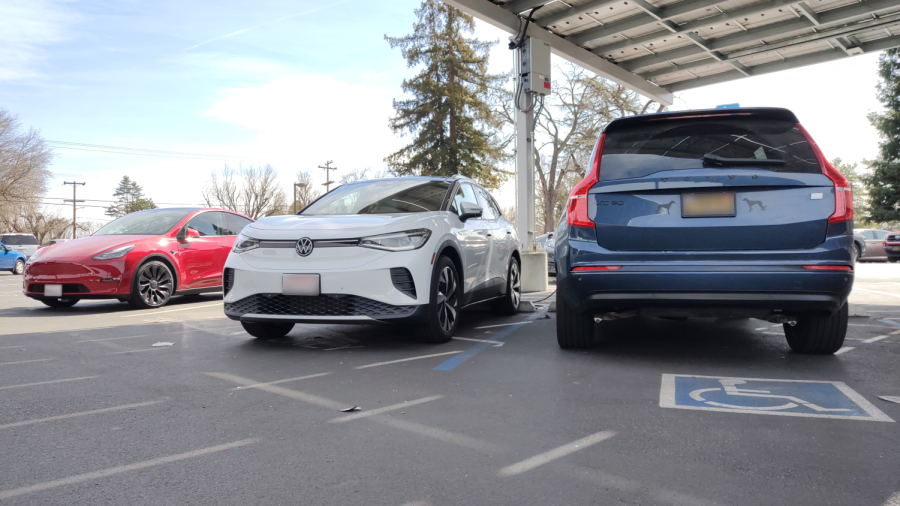Will electric cars replace gas cars
Electric cars are parked along the Amador Valley school electric charging space.
March 23, 2023
People feel it’s a matter of time before EVs dominate the market due to their aesthetics, environmental sustainability, and cheap costs. Since about 7% of Americans own EVs and about 42% of Gen Z’s consider purchasing an electric car, this may be the end of an era for roaring gas cars.
With companies like Tesla, who sold 1.3 million cars in 2022, and the legislature in California blocking the creation of new gas cars starting in 2035, the future of electric vehicles seems like it’s around the corner. However, with the increasing demand for EVs, there are many controversial discussions, such as the concerns over their safety, especially the battery, and the legitimacy of green EVs.
EVs also offer a new market for tech giants who wish to board the gold rush of consumer goods. Including the once legendary company, Sony, to partner with semiconductor designers like Qualcomm to create their brand of cars.
“A new player can enter the automotive market, such as Apple and Foxconn, in Taiwan because EVs are much simpler than traditional automotive vehicles. They don’t need a combustion engine, which is the most complicated mechanical machine,” said the Director of Product Management at Qualcomm, Soshun Arai.
With EVs becoming ever more popular for customers, manufacturers like Ford reported sales increases of over 100%. Though it has yet to replace the gas market, there are many alternative options instead of EVs, such as hybrid and hydrogen engines.
“Personally, I don’t think [EVs will replace gas cars]. But professionally, EVs could replace a part of a combustion engine. The consumer has more options, as someone can buy ICE and internal combustion engines. Some can buy hybrids, some can buy EVs, or others can buy hydrogen engines,” said Arai.
Many view it as environmentally friendly and producing zero emissions. This is partially correct because EVs are not installed with a tailpipe. But the process of producing an EV is the center of controversy as they emit harmful chemicals.
While EVs are very promising due to their portrayal, especially by the government, there are arguments regarding their safety over lithium batteries. EVs use lithium-ion batteries to power a vehicle, but the issues lie in the disposal of the battery.
Currently, only a complex system can recycle lithium-ion batteries, and they are also very flammable, making it more dangerous than a conventional gas car.
“I’m in doubt that EV is environment friendly, but from the customer point of view, maybe yes,” said Arai.
“Manufacturing an EV battery produces a lot of emissions and harmful materials. The user cannot see, or most people don’t consider the process. Still, if you consider the total process of the green battery and the recycling process, I’m not sure if EV is environmentally friendly.”
Not only do batteries pose a hazardous recycling problem, but EVs can also electrocute maintenance specialists who handle the batteries roughly. Though there are standards and rules for maintaining a battery, this is mainly due to improper handling.
Even with the safety concerns of EVs, people still seek to purchase EVs. Due to improvements in technological advancements, purchasing an EV is still a trend. But another factor that sways buyers is the tax credits and upgrade options.
“If people buy the EV, the California government especially gives us a lot of tax credit. So the idea is that you can get some tax refund if you buy an EV,” said Arai.
“And compared to the combustion engine vehicle versus electric vehicle, EV has more fancy or a better cockpit for user experience. So you can change or upgrade the feature by OTA, over the air update, so that’s a huge benefit or advantage that EV has.”
The good news is car manufacturers are continuously improving on EV cars, including the battery, safety systems, and electrifying components. As more research is made for air batteries and electrifying more motors, a more reliable EV car may be heading for the market. EV cars also have a reputation for their safety system during a crash due to their weight and center of gravity.
“Most EVs have a better crash test result because there is no engine under the hood, so there is more space to make a better structure to protect people in the cabin, as a technical advantage. I mean, I believe a better crash test result for more safety is great,” said Arai.





